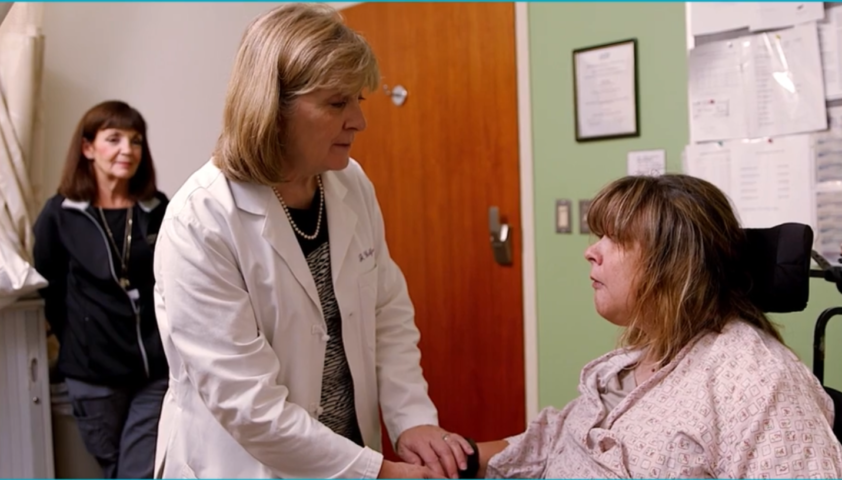
Phone: 212 520 1686
Email: info@yourcpf.org
What to Expect at Your First OB/GYN Appointment
Let’s face it: going to a gynecological appointment for the first time is scary for everyone. But having any kind of disability adds a whole other level of nuance to it. Although changes are underway, the medical system has a long, wrongful history of discriminating against women with disabilities in sexual and reproductive health. This is largely because of the inaccurate, stereotypical view of women with disabilities as asexual beings. However, they are just as likely to be sexually active as their peers without disabilities.
Luckily, the inaccurate presumptions are dissipating, and medical professionals realize the need for more comprehensive and adaptive OB/GYN care for women with disabilities. For example, the Cerebral Palsy Foundation’s Women’s Health Initiative partnered with four institutions to address and improve the state of sexual reproductive health for women with disabilities. NYU Langone’s Initiative for Women with Disabilities has a team of gynecology and wellness providers who specialize in seeing patients with disabilities.
Regardless of which gynecologist you go to, it is crucial to prepare yourself for the appointment. Particularly regarding gynecological care, self-advocacy plays a massive role in ensuring your first appointment goes smoothly and comfortably.
I have spastic cerebral palsy, making involuntary movements hard to control in certain situations, particularly when I’m nervous or uncomfortable. I booked my first gynecological appointment at the start of college since I was being sexually active by then. Although the American College of Obstetricians and Gynecologist recommends that girls have their first OB/GYN appointment between the ages of 13 and 15, I was comfortable waiting until I could go by myself when I was 18. (note: I’m not a medical professional so don’t follow my example!)
Before the Appointment:
After doing a ton of research, I got a better sense of what the appointment would entail and what kinds of accommodations or adjustments I’d need. It’s common that the average gynecologist has little or no experience with disabled patients, so it’s a good idea to call the doctor beforehand to describe the nature of your disability and explain the help you’d need during the examination.
Ask if the facility is accessible and if they have adaptive examination tables, should you need them. If you’re going to the appointment by yourself, consider requesting to have a nurse practitioner in the room, especially if you’ll need help to get on the table or keeping your legs apart during the examination.
If your spasticity would prevent you from keeping still during the exam, your doctor may recommend muscle relaxation techniques such as meditation, or may even prescribe muscle relaxants or sedatives, depending on the scheduled tests.
Before going into the appointment, have your medical history and prescription list ready. Be prepared to answer questions about personal details such as your menstrual period, sexual activities and partners. Also, consider wearing clothes that you can easily get in and out of. Usually, you’ll just have to take your bottoms off, and you’ll cover yourself with a privacy sheet when on the table.
During the Appointment:
You may not need to have a pelvic exam or a Pap smear during your first visit, especially if you’re under the age of 21. Your first visit can entail a general physical exam — similar to ones that your general physician conducts — and an external genital exam, where the doctor looks at your vulva to look for any abnormalities. This exam is also a good way for you to learn about your body.
At the start of the appointment, remember to ask for details about what will take place during the office visit. This way, you can tell the doctor how your body might react, and the doctor can suggest modifications if needed. Also, inform the doctor of any past negative experiences that might trigger you.
Come prepared to ask your doctor about any concerns you may have or if you want to explore birth control options. Based on your level of daily physical activity, the doctor might advise against some hormonal birth controls that increase the chance of blood clots. Your doctor probably has heard of all kinds of questions, so there are no such things as stupid or embarrassing questions!
After the Appointments & Further Tips:
It is the most important to feel safe and comfortable with your gynecologist. So, look for a new one if you weren’t happy with your first one. It’s common to go through a handful of providers before you find the right one for you. In fact, it took me three tries before I found my match! I am so comfortable with her that I don’t spasm during exams anymore.
Depending on your first appointment, you’ll schedule the next one for six to twelve months from then. If you and your doctor agree on doing a pelvic exam or Pap smear at the next appointment, consider starting the discussion of which method might be best for you. There are differently sized speculum and different lubricants that can reduce as much discomfort as possible. Sometimes, the doctor can perform a blind exam that can forgo the need for a speculum.
Keep in mind that the whole process might be a learning experience for both you and your provider. In an ideal society, there wouldn’t be stigmas against women with disabilities in sexual and reproductive care, but we are still a ways away from achieving that. Your interaction with a provider might improve his and her appointment with the next patient with a disability!
For more information and advice on your first OB/GYN appointment, check out this video series created by CPF!
***
Blog written by Sarah Kim





